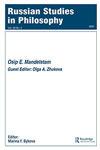晚期托尔斯泰的法律观
IF 0.1
4区 哲学
Q4 Arts and Humanities
引用次数: 0
摘要
摘要托尔斯泰的文学作品,以及他一生中发生的一系列事件,无疑使他在理论和实践领域都对法律有着深刻的认识。在他晚年,这是他对法律持尖锐批评立场的基础。托尔斯泰将法律解释为用非自然语言写成的伪科学,旨在让统治阶级压迫人民并为暴力辩护。法律(pravo)以任意法律机构的形式用伪法律取代了明显的道德法。伪法律扭曲了道德、宗教和法律制度之间的真实关系。托尔斯泰的批评部分源于他与拒绝自然法的实证主义法律解释的冲突。托尔斯泰提出了许多关于法律基础和前提的重要问题:根据立法机构随意制定的积极法律,如果没有最后判决的前景,什么是人类法庭?什么才是真正的法律?有没有比法律更重要、更有约束力的法律?托尔斯泰的问题没有得到回答,他仍然被指责为无政府主义者和法律虚无主义者。本文章由计算机程序翻译,如有差异,请以英文原文为准。
Late Tolstoy’s Perception of Law
ABSTRACT Tolstoy’s literary works, as well as a number of events in his life, leave no doubt about the writer’s deep familiarity with law in both the theoretical and practical spheres. In his later years, this served as a basis for his sharply critical position in relation to law as such. Tolstoy interprets law as a pseudoscience written in an unnatural language, aimed at allowing the ruling classes to oppress the people and justify violence. Law (pravo) replaces evident moral law with pseudo-law in the form of an arbitrary legal establishment. Pseudo-law distorts the true relationship among morality, religion, and legal institutions. Part of Tolstoy’s critique stems from his clash with positivist interpretations of law that reject natural law. Tolstoy asks a number of important questions regarding the foundations and premises of law: What is a human court, according to positive laws adopted at the whims of legislatures, without the absence of the prospect of the Last Judgment? What can be considered genuine law? Are there laws more important and more binding than juridical ones? Instead of having his questions answered, Tolstoy is still reproached as an anarchist and legal nihilist.
求助全文
通过发布文献求助,成功后即可免费获取论文全文。
去求助
来源期刊

RUSSIAN STUDIES IN PHILOSOPHY
PHILOSOPHY-
CiteScore
0.10
自引率
0.00%
发文量
14
期刊介绍:
Russian Studies in Philosophy publishes thematic issues featuring selected scholarly papers from conferences and joint research projects as well as from the leading Russian-language journals in philosophy. Thematic coverage ranges over significant theoretical topics as well as topics in the history of philosophy, both European and Russian, including issues focused on institutions, schools, and figures such as Bakhtin, Fedorov, Leontev, Losev, Rozanov, Solovev, and Zinovev.
 求助内容:
求助内容: 应助结果提醒方式:
应助结果提醒方式:


